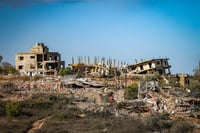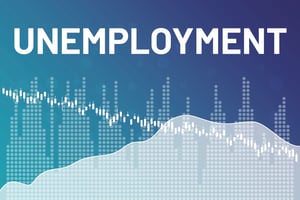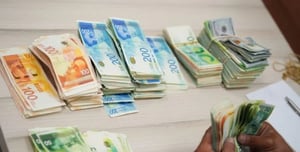
"In times of war, you need to stop marketing and start managing your business financially. There are various solutions," says Aryeh Akerman, a resident of Kiryat Shmona, holding a bachelor's degree in economics and a master's degree in human development consulting. He is a marital counselor, writes for the magazine "Pnima", and has been a business owner for 21 years.
Crises, operations, and wars are not new to him. In the past, he owned a pizzeria in Kiryat Shmona, and now he also manages a hospitality villa and serves as a business consultant in Maof - The Agency for Small and Medium Businesses (Ministry of Finance).
"In times of war in the country, there's also a battle over cash flow. Businesses have stopped bringing in income, and there is a lot of uncertainty about the future," Akerman opened. He has experienced economic and personal crises firsthand, emerged much stronger and converses about financial resilience during a crisis.
I find Aryeh in an apartment in Haifa, having left his home for an unknown period of time. He is armed with tools and has a belief that we will emerge stronger from this situation. As I mentioned earlier, for the past 21 years, he has been a "chewer," as he defines it, of the concept of being self-reliant in the affected region of the State of Israel.
"Even now, I am in the midst of a crisis involving tens of thousands of shekels that the state cannot absorb," he states. Therefore, he is required to answer how to build economic resilience in times of crisis.
"Every five years there is a crisis, every self-employed person must take this into account"
The first piece of advice that Akerman provides is a retrospective view: "Self-employed individuals need to take into account that every few years there is a wave that covers the self-employed, and they are left without income. As someone who is self-employed, you need to ensure an oxygen tank that enables survival in rough waters. Every self-employed individual needs to take care of an oxygen tank; it's not like an employee who receives a fixed salary."
Akerman opposes the advisors who encourage marketing aggressively right now. He states, "Many advisors recommend publishing digital courses and promoting the business with full force right now. This is not the time. There are businesses like carpentry, restaurants, etc., that cannot market themselves now. The business is closed, the economy is slow, there's no shopping mood. Therefore, every self-employed person should build a mental understanding that in the life of a self-employed individual, there are losses. Every five years, I advance by X and lose Y. You need to see to it that the loss is smaller than the income. Then, if you take a loan of 100,000 shekels, you take it into account because you know your business."
Ackerman's business in Kiryat Shmona suffered a significant loss during the Second Lebanon War. He expressed, "Throughout the entire war, I felt as if a massive wave was sweeping over me. I'm drowning; I'm trying to keep my head above water, but I'm not succeeding. Alongside the casualties, the war, and existential anxiety for the future, a heavy debt of 200,000 shekels weighed me down. I felt I had no air, that I wouldn't get out of it. It hung over me." Here, Akerman promised himself to build an oxygen tank to help him overcome this wave, and he made another important decision that was crucial.
"Financial management is the oxygen of business"
Akerman's next piece of advice is that self-employed individuals should understand financial management: "Break down your debt into small pieces, understand supplier credit, defer payments, understand debt allocation, consider appropriate loans, and work on the specific management of updating data in tables, something that business owners tend to neglect," he says. He points out that businesses in Israel often focus on marketing but struggle with business management. "You must invest energy in financial flow management correctly; you need to understand the subject. After the Second Lebanon War, I invested my energy in understanding proper management and broke it down into components to allow me to take healthy steps for the business."
Three hours of free consultation from the Ministry of Economy
In conclusion, Akerman looks at the bigger picture and expresses his deep belief in a higher power: "There's a great plan beyond, I not only believe in the Almighty, I know He cares for me, and there's absolute providence in my life. Give Him a place to care for us; it's a wonder how He operates in the world." Arieh brings a small example from his own experience: "After the Second Lebanon War, Israelis from all over the country came to shop in the north to strengthen the economy. Within a week and a half, I made a month's income." He describes this with excitement and adds, "We are heading toward something great with Israel awakening more than we've ever seen. Surely there will be good news."
From a practical standpoint, Akerman offers three hours of free consultancy for businesses as part of a project by the Ministry of Economy's "Maof" program. This project provides a financial plan for business recovery. To participate in the program, you can contact him via email at akerman545@gmail.com.


























